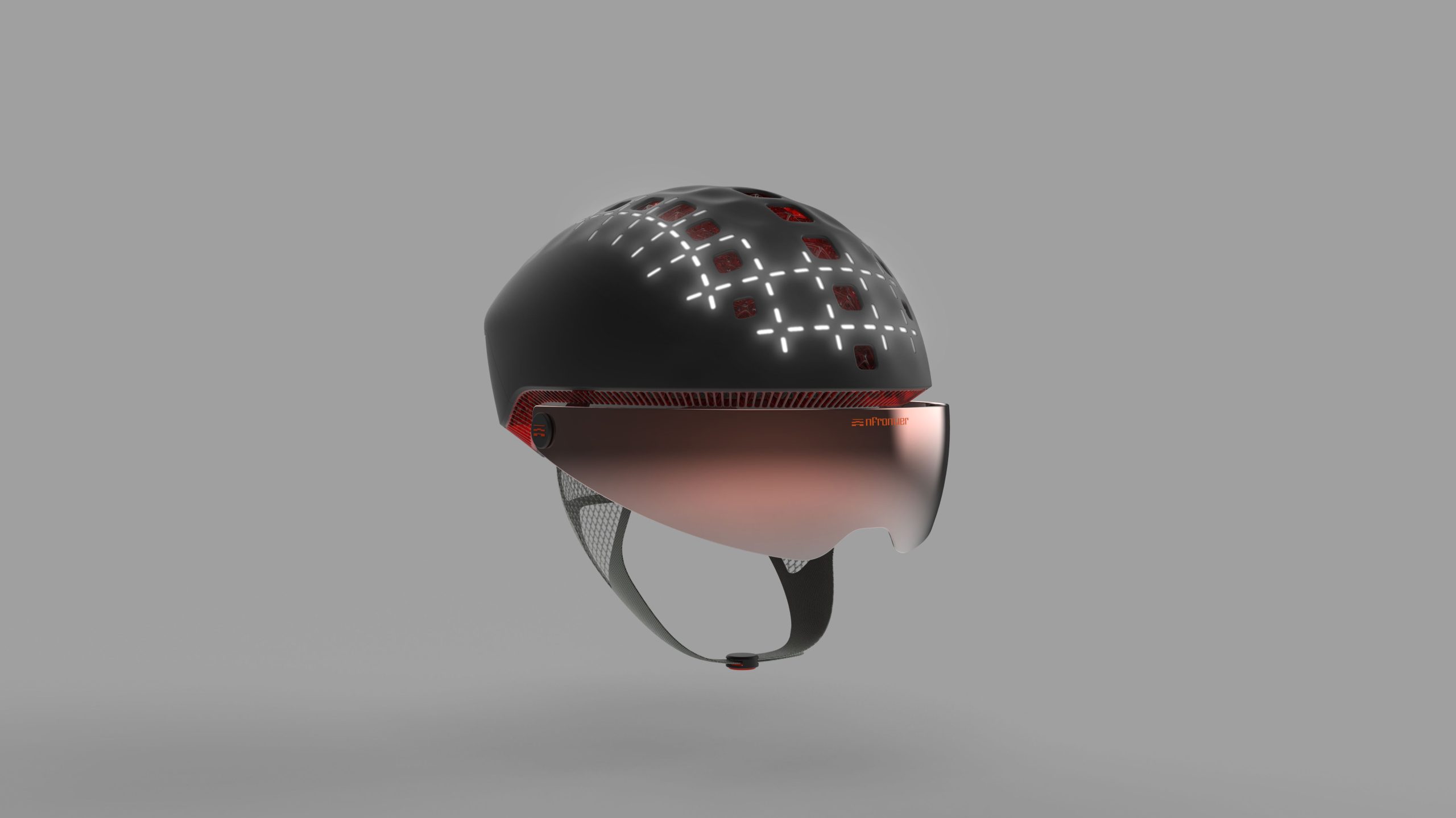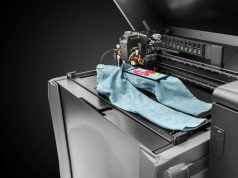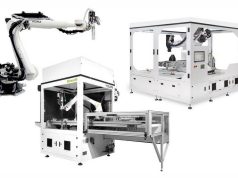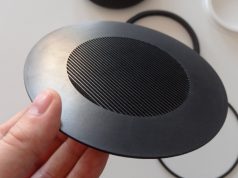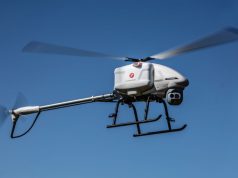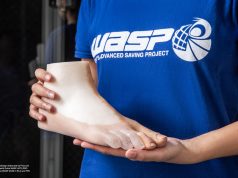Riding your bike is about to become as safe, smart and high-tech as never before. PYLO, a stunning bike helmet prototype, for the first time combining the latest in digital, safety, design and manufacturing technologies, has been premiered in Germany.
Featuring a fully integrated Face Shield Airbag, a Smart 360° Surround Safety System and a 3D-knitted inlay, the helmet will revolutionize the way we are riding our bikes in the future. PYLO has been developed and designed by Berlin-based Innovation Studio nFrontier and is currently being reviewed for market entry.
“Our vision was to develop an exciting next generation helmet that will advance bicycle rider safety technology into the 21st century. We wanted to create a previously unseen experience – converging different technologies, features and materials into one helmet”, explains nFrontier CEO Daniel Buening, who also conceptualized the helmet.
“We designed our helmet with the needs of both urban commuters and athletes in mind, combining lightweight materials with a contemporary stylish design and cutting-edge technologies“, adds nFrontier Chief Design Officer Beatrice Mueller.
PYLO is a stylish prototype, combining many industry-first features, including key automotive safety and driver assistance technologies now applied to a bicycle. The highlight among these is an airbag protecting the lower face from injuries, complemented by an array of smart safety high-tech such as LIDAR radar sensors, 3D immersive sound, LED light indicators, and many more.
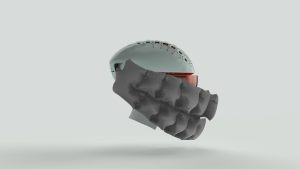
Using the latest innovative production technologies for the first time in bicycle helmet design, a 3D Knitting produced liner keeps the helmet in place and guarantees a perfect, individual fit while offering a maximum level of comfort. The liner’s surface properties can be knitted with a double layer with cotton on one side and wool on the other. Depending on the season, it can be worn on either side to keep the contact surface cooler or warmer, respectively. The 3D-printed nylon structure is breathable and optimized in order to absorb deep impact – at a much higher level than conventional mass-market polystyrene helmets. For extra protection and better visibility in bad weather, the helmet is equipped with a visor and integrated LED lights.
PYLO’s highlight feature, however, is the world’s first Face Shield Airbag designed for a bicycle helmet, protecting the jawbones, teeth and eyes. In case of an accident, it blows up from the rear to provide rider face protection. This novelty exceeds even today’s most advanced bicycle airbags as these only prevent heavy upper head injuries, protecting the brain and skull. In addition, airbag technology for bike riders has remained fairly simple and heavy to wear around the neck. For this reason, UCI (Union Cycliste Internationale) regulations don’t permit their use by professional athletes.
In recent years, global bicycle markets have been surging, thanks to consumers’ demand for sustainable mobility and physical exercise on the one hand, and cities deciding to ban cars and make downtown areas greener, on the other hand. Bike popularity has accelerated dramatically during the Covid-19 pandemic due to anxiety over public transportation, firmly establishing the bike as an effective alternative both for last-mile connectivity and commuting. A growing product range including easy-to-handle, mid-priced bikes and hybrid, state-of-the-art (e-) bikes have accelerated this trend. However, with growing popularity, the number of accidents has climbed, too: In the U.S., for example, the number of preventable deaths from bicycle transportation incidents have increased 44% in the last 10 years, from 873 in 2011 to 1,260 in 2020.
“To enhance bike rider safety, we see the urgent need for a technology transfer from the automotive, electronic and computer industries”, says Daniel Buening. “Reducing the number of accidents is a key driver to bicycle utilization as a means for sustainable mobility.”
Therefore, the PYLO designers developed a 360° Surround Safety System with LIDAR at its heart: an audio warning system alerting the cyclist of dangerous dead-angle situations or vehicles approaching with high-speed. Operating with 3D immersive sound, which offers the advantage of a free-range 360 degrees scanning zone, the LIDAR will indicate the exact location or direction of a safety threat, by signaling a directional and clear overlay warning sound. nFRONTIER’s engineers opted for an audio-based system providing higher level of safety for riders compared to visual- and AR-based systems.
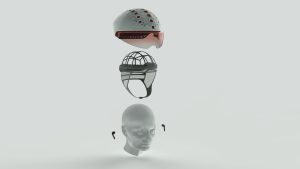
For even more safety in heavy urban traffic, the helmet also features LED head and rear lights and LED indicators; these are activated by simply double-tapping the left or right side of the helmet while riding the bike. Gyrosensors automatically detect rider’s maneuvers to turn on brake lights. The 3D knitted liner also keep ear phones safely in place which are connected to an active warning app alerting the cyclist of a dangerous situation before approaching it. All helmet features will be controlled by a smart phone-based helmet app serving as interface between the cyclist and the helmet and providing safety features like turning head lights on or off and connecting the wireless sound earphones.
nFrontier is an impact-driven innovation studio accelerating the development and launch of industrial products – making the process faster, more successful, more digital and sustainable. Fuelled by emerging technologies, benefitting from market insights and pioneering teams, and, crucially, using a proprietary A to L operating model, at the core of nFrontier operations is the nFrontier EmTeCe (Emerging Technology Center). Aiming at becoming one of Europe’s leading facilities of creatively applied Emerging Technologies in soft- and hardware, the EmTeCe is enabled by the expertise, high-tech equipment and infrastructure provided by technology partners such as Stratasys (Additive Manufacturing), Franka Emika (Tactile Robotics), Autodesk (software development), Vajo (VR/XR products), and KeyShot (3D rendering software).
For more information about nFrontier, please visit nfrontier.de.
Subscribe to our Newsletter
3DPResso is a weekly newsletter that links to the most exciting global stories from the 3D printing and additive manufacturing industry.



